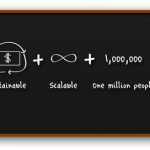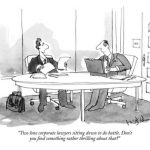Wisdom, Technology and Social Enterprise — Reflections on Wisdom 2.0
It often feels like technology is the problem. I would be much more centered and relaxed, for example, if I didn’t have to contend with the constant pressure of e-mail. Or, if the iPhone wasn’t so damned compelling, perhaps I would be less distracted in my moment-to-moment life and more likely to look the cashier in the eyes and smile.
So, the Wisdom 2.0 conference intrigued me as the speakers included not only some of the most prominent spiritual teachers in the US, but also some of the most recognizable names in technology. I must admit, I started the conference with some skepticism about the idea of Silicon Valley spirituality, but I left inspired and with some interesting questions to ponder. The conference also offered important reminders about how to be a happy and effective leader.
Here are the key reminders, questions and action items that came out of the conference for me:
The reminders:
- There is nothing more important than NOW – this very present moment. The past is gone, the future only a possibility and most of my thoughts distract me from the truth rather than serve it.
- HOW I work is more important than WHAT I accomplish at work. I seek to measure so many aspects of my professional life, but what is the use of any of it if I am not happy in my day-to-day life? Is stressed out and sleep deprived the change I want to see in the world?
- Mind and heart are inseparable. In many Asian languages, the word (character) for heart and mind are the same (so I’ve been told). If I close my heart, my mind will not function as well and vice versa. I need to make sure I engage consistently both in my work life. The CTO of Cisco talked about how as the leader of 20,000 plus engineers she must make many hard decisions, and that she tries to make all of them – even the most cutting – with the heart of service.
The questions:
- Would I advise Larry and Sergey to incorporate Google as a California benefit or flexible purpose corporation? Google co-hosted the conference and the Google executives I talked to clearly viewed their personal professional goals – and the company’s mission – as principally “social.” They expressed the view that Google makes decisions not based on profits, but on what best advances the mission of making vital information accessible and free. Sounds like the kind of company that many would say should incorporate under one of the new statutes, but my hunch is that I would advise against it. Just in case they ask, I will come up with a well reasoned response and share in a subsequent blog.
- The question above relates to a larger one of whether labels like “social enterprise” and “impact investing” are more likely to unite the global business community around a shared set of positive values or create barriers to communication and collaboration. In my usual crowds, the terms social enterprise and impact investing elicit either nodding heads or blank stares. In a conversation at the conference, the term “impact investing” triggered a strong – almost visceral – negative response from a high profile VC investor. He gently punched me in the chest to demonstrate what he viewed as the aggressiveness of the word impact (here’s “impact” he declared), and he became animated enough that a small crowd soon assembled. It became clear that the crowd also viewed the term with suspicion. Hmmm.
- I ask myself this question a lot, but I found myself asking it from a more grounded place over the last couple of days: how effectively am I using my time in service of my deepest values and aspirations? This arose partly from a discussion of managing e-mail, and the fact that the most recent content of e-mail often determines how we spend our time on a day-to-day basis.
The action items:
- Become part of a leadership community. The day before the conference I felt burned out, depleted – approaching cynical. Within five minutes after the conference started, I felt refreshed and re-inspired. The support I felt from like minded peers made the difference. I realize I need that support on a regular basis if I want to make this journey of heartful leadership a long one.
- Put happiness on the agenda. In our weekly team meeting, we discuss current client projects, review our performance against the prior week’s goals and set new goals for the upcoming week. Starting next week, we will also review our happiness level for the prior week, and identify that which caused noteworthy increases or decreases in our work happiness.
- Read Congressman Tim Ryan’s book “A Mindful Nation.” Tim Ryan is a congressman from Ohio whose district includes the poorest city in the US (according to him). He is also an outspoken proponent of how mindfulness practices can improve everything from education to health care to veterans assistance (about one military personnel a day commits suicide). It was tremendously encouraging to hear a young charismatic political leader from the Midwest talking about ideas that I feared were only popular in the coffee shops of Boulder and Berkeley.
- Let go, do less and invite others on my team to take more responsibility. Starting now (going for a run :)).





